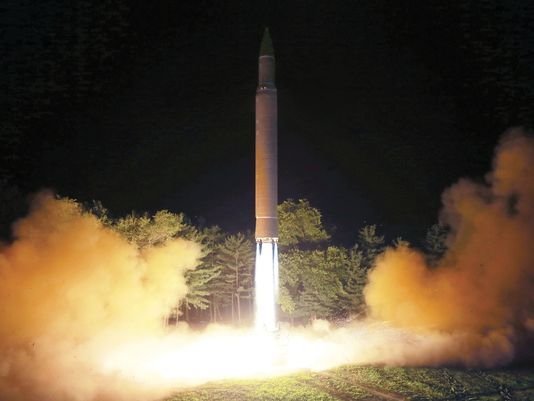North Korea threatens missile strike on Guam; Trump vows 'fire and fury'

North Korean leader Kim Jong Un "has been very threatening beyond a normal state, and as I said they will be met with fire and fury and frankly power, the likes of which this world has never seen before," he said.
Yonhap reported that the North's strategic force in charge of the country's ballistic missiles issued a statement that it is seriously reviewing measures to send a strong message that it can neutralize the U.S. military bases in Guam that house nuclear bombers and other key assets, with its Hwasong-12 missiles.
In January, Trump tweeted: "North Korea just stated that it is in the final stages of developing a nuclear weapon capable of reaching parts of the U.S. It won't happen!"
The DIA completed the latest analysis on the miniature warhead in July, shortly after another intelligence assessment that sharply raises the official estimate for the total number of bombs in the communist country’s atomic arsenal.
The warhead breakthrough is considered a crucial advancement on the path to producing a nuclear weapon capable of striking the U.S. mainland, experts said.
“Today is the day that we can definitely say North Korea is a nuclear power," Harry Kazianis, director of defense studies at the Center for the National Interest, told USA TODAY. "There is no more time to stick our heads in the sand and think we have months or years to confront this challenge."
Kazianis said it still is not clear whether North Korea has developed heat shield technology required to allow a missile to leave and re-enter the atmosphere. But he said the U.S. should assume the worst. "Today is truly a sad day indeed," he said.
U.S. defense officials have said there are few good military options to deal with North Korea. In addition to its nuclear arsenal, the nation has rockets and artillery aimed at Seoul, the South Korean capital that is only 35 miles from the Demilitarized Zone.
"It will be a war more serious in terms of human suffering than anything we’ve seen since 1953," Defense Secretary Jim Mattis said earlier this year. "It will involve the massive shelling of an ally’s capital, which is one of the most densely packed cities on earth."
"We are at a point in time where choices will have to be made one way or the other," Gen. Mark Milley, the Army chief of staff, said recently. "None of them are good.”
The DIA and Pentagon did not immediately respond to USA TODAY's requests for comment on the Post report. The State Department declined to comment citing "intelligence matters."
The DIA 's latest assessment comes against a backdrop of growing international concern regarding North Korea's nuclear and missile testing. North Korea has launched more than a dozen test missiles this year. Concerns were heightened late last month when tests of an intercontinental ballistic missile indicated Pyongyang may be within a year or two of obtaining the technology to reach the U.S. with nuclear missiles.
China, Pyongyang's biggest supporter, on Sunday urged North Korea to halt its testing. That came a day after China and Russia joined with the United States in a unanimous U.N. Security Council vote approving the toughest economic sanctions yet against the increasingly isolated regime.
The sanctions target about a third of North Korea's estimated $3 billion in annual exports. North Korea expressed outrage at the U.N. vote, vowing to launch “thousands-fold” revenge against the United States.
The U.S. has expressed a willingness to work with Kim. Secretary of State Rex Tillerson said last week that the U.S. was not demanding regime change and was willing to talk with Pyongyang — if the North agrees to abandon its quest for nuclear weapons.
North Korea has repeatedly refused to conduct any negotiations aimed at halting its nuclear progress. Experts on the crisis repeated a call made by the Trump administration in recent months: China, North Korea's top trading partner and protector, must step in.
"Today's news makes clear that much more than these sanctions is required to protect U.S. interests," said Jay Lefkowitz, a former U.S. special envoy on human rights in North Korea. "But if we expect China to really crack down on NK, we need to be serious about what China's interests are."
Kazianis said China must enforce the sanctions and strip North Korea of vital resources used for its militarization.
"If they don’t, we will wake up one morning and discover North Korea has tested a hydrogen bomb or a three-stage ICBM — and that could hit ALL of the U.S. homeland.”
awesome